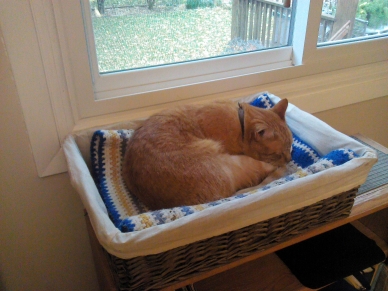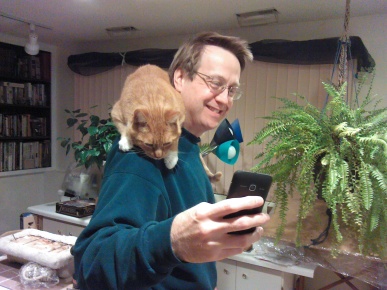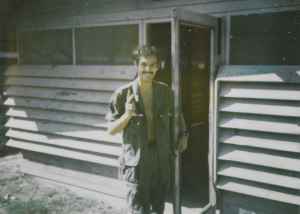 By: Mark Deisinger
By: Mark Deisinger
My friend Lewis was rescued very young from a dumpster in Duluth and eventually made his way to our house. I remember when we first brought him home. He seemed to like going under the futon in our spare bedroom, inquisitive but very unsure about us and what was happening. It wasn’t long before Lewis had the run of the house, dozing in the sun on one surface or another, and, in the winter, jumping up into our laps the moment a fleece blanket was deployed. He was affectionate, gentle, and liked everybody. Growing up I was a “dog person,” but I had now fully become a “cat person.”
Several weeks ago, Lewis’s breathing became labored and he started losing his appetite. The latter was especially alarming because he was legendary for scarfing down every molecule of his daily allotment in three minutes and then immediately begging for more. The vet’s x-rays revealed that his chest cavity was filling with fluid, a condition called pleural effusion. The exact cause remains a mystery, but it was likely that he suffered from congestive heart failure or possibly even cancer. He was about 11 years old by this point, still youngish for a cat. He lingered for a few weeks, but we knew that cats don’t really show distress and we worried that he was in pain. He seemed content to sit on a lap or in his basket, but he was only comfortable in certain positions, and those not for long. We knew the end was near, and we were sad and in distress ourselves. We didn’t want him to suffer. We didn’t want ourselves to suffer watching this play out.
Eventually he couldn’t move very well on his own, and one afternoon we heard him meowing loudly from another room, which was unusual. We approached to find that he had soiled his surroundings because he could no longer make it to the litter box. It was time. We held him as closely as we could without causing him discomfort, and we held each other closer.
The morning of April 9, I had an early commute to work for some training that I could not avoid or reschedule. I said my last goodbye to Lewis as he sat uncomfortably in his basket on the bathroom floor. Sharon took him to the vet a few hours later, and now Lewis is gone and the house is less bright and less warm. We are glad his suffering is over, and we are grateful that he spent his life with us, but there is real pain in our hearts.

All of this puts me in mind of a passage by C. S. Lewis (yes, the name of our cat is no accident) from his phenomenal The Four Loves:
“To love at all is to be vulnerable. Love anything, and your heart will certainly be wrung and possibly be broken. If you want to make sure of keeping it intact, you must give your heart to no one, not even to an animal. Wrap it carefully round with hobbies and little luxuries; avoid all entanglements; lock it up safe in the casket or coffin of your selfishness. But in that casket – safe, dark, motionless, airless – it will change. It will not be broken; it will become unbreakable, impenetrable, irredeemable. The alternative to tragedy, or at least to the risk of tragedy, is damnation. The only place outside Heaven where you can be perfectly safe from all the dangers and perturbations of love is Hell.”
Like many, I had some negative experiences growing up and learned the bad habit of shielding myself from pain by removing myself from people. It was mostly schoolyard kid stuff, but it stuck with me. I became distrusting and cynical as I grew older, and generally started regarding most other people either as threats to be avoided or irrelevant to my daily life. By God’s grace I’m much less that person any more. I’ve been known to jokingly tell people that I’m a recovering misanthrope, but it’s not a bad assessment of my past and present attitudes.
This self-imposed isolation, this cutting people out of our lives, is, as the human Lewis implies, extremely dangerous to our spiritual health. The number of reasons is large: others who are honest with us act as mirrors, showing us ourselves, flaws included; others can be there to hold us up when we’re dealing with calamity; others can pray for us. You can think of a dozen examples without straining yourself.
The older I get and the longer I spend as a Christian, the more I believe that relationships are at the core of the human condition, that they are the purpose for the Christian faith, that they are the reason for the existence of the universe, time, everything. God, who is our example and after whose image we are made, expresses in the Trinity the perfect loving relationship within Himself, as the Father, Son, and Holy Spirit remain in unity and love with each other. Jesus, the Son, came to Earth to save us from our broken condition so that we could eternally be in perfect harmony and love with God and each other. I thank God that He cares enough about me to keep working on this area in my life. I know it makes me vulnerable to the risk of tragedy. I would have it no other way. Jesus himself faced the agony of death by crucifixion so that the way would be opened for love.



 In grieving the recent loss of my dad, I’ve been reminded of the many wonderful characteristics he has blessed me with, but of also the shortcomings we share. I credit him with my deep faith and heart for God, adventurous, independent spirit, persistence and resourcefulness. But there are also some less attractive traits, one of which I will call “Right.” For me this includes the need to be right and the need to do it right (perfectionism). Both of these are toxic to relationships. Ask Al.
In grieving the recent loss of my dad, I’ve been reminded of the many wonderful characteristics he has blessed me with, but of also the shortcomings we share. I credit him with my deep faith and heart for God, adventurous, independent spirit, persistence and resourcefulness. But there are also some less attractive traits, one of which I will call “Right.” For me this includes the need to be right and the need to do it right (perfectionism). Both of these are toxic to relationships. Ask Al. I have a pride problem. I want to say that it’s other people’s pride, but it’s really my own.
I have a pride problem. I want to say that it’s other people’s pride, but it’s really my own. Attempting to control anything when it comes to small children is futile. The absolute worst is trying to get out of the house. I make my plan to leave at a specified time, taking into account missing shoes, bathroom breaks, and little people running around elusively. Yet with all those things factored in, I still cannot leave at the time of my choosing because of unforeseen circumstances and meltdowns…sometimes my own meltdowns!
Attempting to control anything when it comes to small children is futile. The absolute worst is trying to get out of the house. I make my plan to leave at a specified time, taking into account missing shoes, bathroom breaks, and little people running around elusively. Yet with all those things factored in, I still cannot leave at the time of my choosing because of unforeseen circumstances and meltdowns…sometimes my own meltdowns!
 Excuses can feel like wonderful things. Any parent can tell you of the countless times that they heard an excuse from their child to make a punch ok, provide excellent justification for a job partially done, disprove decades of research on the nutritional benefits of cookies, and generally absolve responsibility for mischief…at least in the mind of the offender. For anyone on the receiving end, though, it’s more often a source of frustration or comic relief.
Excuses can feel like wonderful things. Any parent can tell you of the countless times that they heard an excuse from their child to make a punch ok, provide excellent justification for a job partially done, disprove decades of research on the nutritional benefits of cookies, and generally absolve responsibility for mischief…at least in the mind of the offender. For anyone on the receiving end, though, it’s more often a source of frustration or comic relief.






